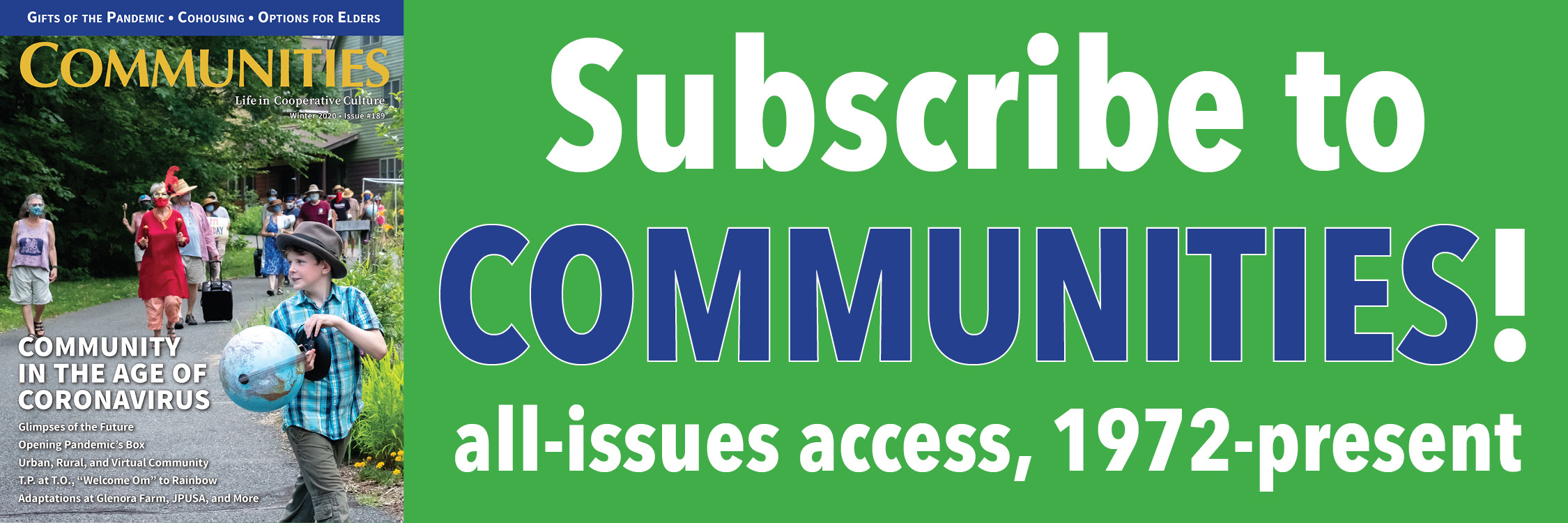Author: Chris Roth
Published in Communities Magazine Issue #145
This year’s discussion on health care policy in the United States has focused attention on ways to assure broader access to allopathic medicine, including controlling the costs of health insurance and medical care. All of us, even those who use allopathic medicine only infrequently, have a stake in this debate (whose outcome, which may be known by the time you read this, is still a mystery as I write it). In community, as elsewhere, many of us currently go without health insurance, and are very vulnerable in cases of unexpected medical costs.
But this issue of COMMUNITIES is not about national health care policy.
In these pages, we explore how we can take charge of our own health and well-being, independent of larger government programs and policies. While the health insurance lobby may be able to block optimal solutions on a national scale, that doesn’t mean we in our smaller communities are powerless.
We asked potential contributors a slew of questions: What role does community play in supporting health and well-being? How do organized intentional communities address their members’ health and well-being needs? Do community-based alternative forms of “health insurance” hold promise? How do groups deal with illness and physical- or mental-health challenges? Are certain health-care modalities especially effective in a cooperative setting? How do individuals support their own health and well-being in community? What is the role of emotional and spiritual well-being in overall health of community members?
And we received a wide range of responses, a selection of which fill the rest of this magazine. (As a side note, if you are interested in contributing to COMMUNITIES by answering similar questions about future themes, please use out web contact form to be added to our Call for Articles list. We also post themes at http://www.ic.org/submissions-to-communities-magazine/.)
Reflecting on this topic myself, I’ve noticed a number of elements that seem essential to well-being and that can be nurtured by community. These include:
Being inspired by what we do. Satisfying work, reflecting our visions, passions, and talents while also serving our communities, is one of the best preventative and healing medicines around, especially when it contributes tangibly to the well-being of others in our lives. Conversely, if we are not inspired by our work and other activities, if they tend to drain us rather than feed us and others, they can literally make us sick. Community can offer an arena in which to reduce our monetary needs through cooperation, simpler living, and mutual aid; engage in a greater variety of work; and explore the idea that we can always feel inspired about what we are doing (and if not, something’s out of balance).
Human connection and support. The importance of friendship, family, and social networks in contributing to health, well-being, and longevity is not new news, nor is it confined to intentional community settings. Community of any kind can give us more reasons to be well, and more ability to maintain that condition too. By the same token, social isolation, alienation, and loneliness can deprive us of not only some of the motivation to take good care of ourselves and one another, but of the means of doing it, and can lead us toward health-destroying habits that promise, at best, to shorten our period of misery by ending it early, in death.
Health-maintaining lifestyles, including diet and exercise. Community can act as a catalyst toward healthier ways of eating, living, and practicing preventative care. Many people’s diets improve markedly when they join with others in community, sharing cooking responsibilities and bringing their food choices more in line with their values and their health. Community can also encourage healthy physical activity, whether in shared gardening plots, construction projects, environmental restoration work, yoga sessions, ultimate frisbee games, or other alternatives to sitting around on a couch by oneself watching television and ingesting various combinations of sugar, corn syrup, salt, grease, artificial flavorings, preservatives, and white flour.
Self-expression and communication. Community nearly requires us to express ourselves and to communicate with one another; if we don’t do those things, we can barely call the result community (instead, it may resemble a shared prison in which all prisoners must remain mute). Self-expression and communication, undeniably good for the soul and therefore for our health, can flourish in community settings, as we inspire one another to explore our creativity and learn from one another how to talk, listen, and otherwise communicate in effective ways.
Other health-promoting items on my list: Quiet and contemplation; connection to nature; maintaining a healthful, sanitary environment; humor; laughter; flexibility; respect; gratitude…and knowing (as with this piece of writing) when to stop.




















